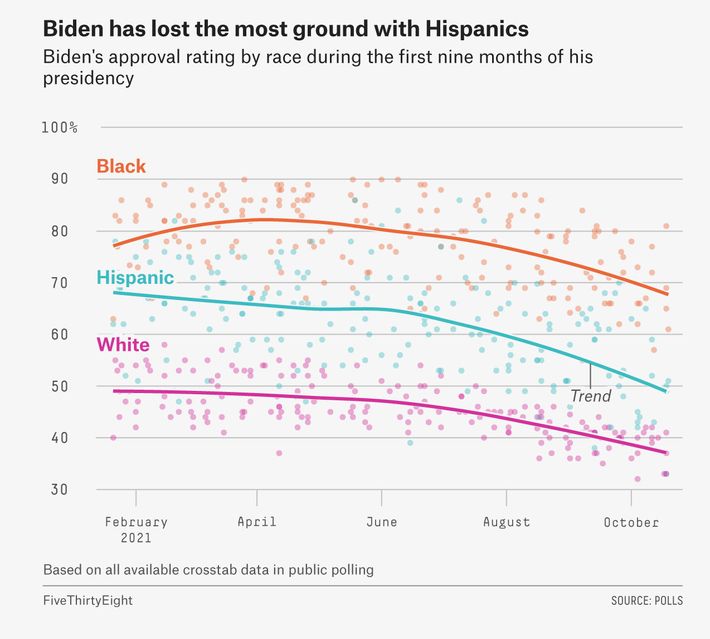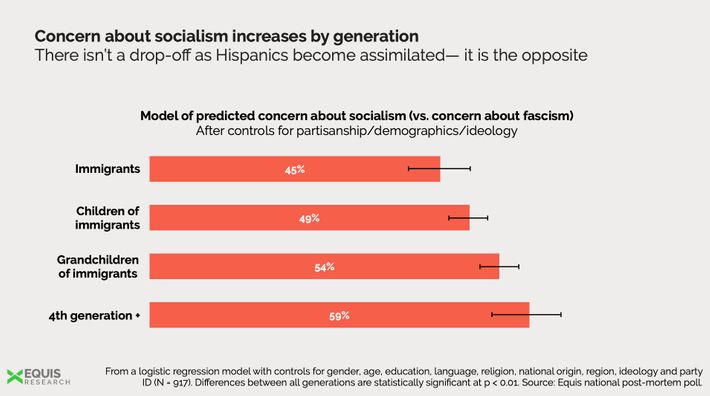
This winter, Democratic strategists have many causes for discontent. Inflation is eroding Joe Biden’s approval rating and his party’s standing in 2022 midterm polls. The president’s stalled agenda is dispiriting progressive activists and keeping the media’s focus on Democratic disarray. In recent polls, Donald Trump is holding his own in a hypothetical 2024 rematch.
But it’s possible that no political development worries blue America’s operatives more than Hispanic voters’ rightward drift.
Biden’s approval rating has declined with just about every demographic. But no racial or ethnic group has soured on the president more than Hispanics, according to FiveThirtyEight’s aggregation of all available polls.
In one recent survey from The Wall Street Journal, Hispanic voters were about evenly split between Republicans and Democrats on the question of which party they intended to support in next year’s midterms. And in a hypothetical Biden versus Trump rematch, the two candidates were statistically tied among Hispanics. The poll is an outlier, and its sample of Hispanic voters is small. But such a result would scarcely be possible in a world where Hispanic support for the Democratic Party was at remotely normal levels.
Of course, all this comes in the wake of an election that saw the GOP gain eight points among Hispanic voters, according to the Democratic data firm Catalist.
What makes this trend so menacing for Democrats is that it threatens to block the party’s most plausible path to retaining federal power even if white working-class unionist Democrats in the Rust Belt go extinct. Hispanics are already the largest category of non-whites in the United States, comprising 19 percent of the U.S. population. Between 2008 and 2020, the Hispanic share of the electorate increased by about 30 percent. And the group is poised to grow considerably in the years to come.
Thus, if one assumed that Democrats would keep winning roughly 70 percent of the Hispanic vote — as they did in 2012 and 2016 — then the party’s medium-term prospects in the Sun Belt looked promising. Even if the post-industrial Midwest kept trending away from the party, Texas’s rising Hispanic population could eventually turn the Lone Star State blue and make the Electoral College biased toward Democrats in the process.
On the other hand, if Hispanic voters are in the process of emulating the political trajectory of the so-called “white ethnics” — which is to say, growing more conservative as a portion of the population assimilates into whiteness and moves up the socioeconomic ladder — then Democrats would be in profound trouble. Already, due to the party’s scant support in overrepresented rural areas, Democrats need to win large popular majorities in order to compete for federal power. If Hispanic voters become an evenly divided voting bloc, the GOP could lay claim to a coalition that isn’t merely more geographically efficient than the Democrats, but larger to boot. In which case, Republicans would be in position to dominate American politics for the foreseeable future.
So it’s pretty important for Democrats to figure out why they’re losing ground with Hispanic voters and what they can do to stop it.
Earlier this year, Equis Research, a progressive data firm dedicated to analyzing Hispanic voters, released an in-depth report on where Trump’s gains with the ethnic group came from, in both geographic and demographic terms. Among its findings: Trump won over a significant number of previously nonvoting Hispanics, gained more new votes from Latinas than Latinos (even as he did better with the latter in absolute terms), and did especially well in Miami-Dade County and Rio Grande Valley.
This week, Equis released the second half of its 2020 postmortem, which attempts to explain why these rightward shifts materialized through an analysis of large-sample, post-election surveys of Hispanic voters.
The report offers Democrats cause for comfort, along with plenty of grounds for concern. Here are four of its more notable findings:
1) COVID-19 has likely played a big role in pushing Hispanic voters right.
In Equis’s poll, two-thirds of Hispanic 2020 voters voiced approval for Donald Trump’s position on reopening the economy, while 55 percent endorsed his view that Americans should “live without fear of COVID.” This is not entirely surprising. Hispanics are disproportionately likely to work in industries that were adversely impacted by shutdown orders, such as hospitality and food service.
For a small but significant minority of Hispanics, Trump’s relative nonchalance about the COVID pandemic proved decisive in their vote choice: Among Hispanic Democrats and independents who backed Trump in 2020, 34 percent said that COVID was the most important issue in determining their vote. Nearly as high a percentage named “the economy”; obviously, in 2020, public-health policy had major economic implications.
Thus, it looks like Democrats’ reputation as the party more serious about combatting COVID — a clear asset with some segments of the voting public — backfired with marginal Hispanic voters, who feared the economic consequences of stringent anti-pandemic protocols.
This is a relatively encouraging finding for Democrats. It suggests that the GOP’s gains in 2020 partly derived from a (God willing) temporary policy controversy, and that Biden’s current struggles may also be partly attributable to that same ephemeral issue.
2) A large number of Democratic Hispanics are quite ideologically conservative.
Equis finds that the GOP’s attempts to brand the Democratic Party as “socialist” likely had an impact in 2020. Nationally, by a narrow margin, Hispanic 2020 voters said that they were more concerned about the Democratic Party embracing socialism than about the Republican Party embracing fascism. Equis tried to ascertain what these voters meant when they expressed fear of socialism. The most commonly cited concern was that under socialism, “people will become lazy/dependent on government.” Unlike fears of the suppression of free speech, this concern indicates a skepticism of social democracy, not merely totalitarian Stalinism. Which is to say, it suggests that there may be a genuine ideological tension between Joe Biden’s Democratic Party and the anti-socialism segment of the Hispanic electorate.
One interpretation of Hispanic anti-socialism is to see it as an artifact of an older generation’s direct experience with socialist regimes in Latin America. But Equis’s data suggests that it’s at least as reflective of a younger generation’s integration into America’s conservative political culture: Concern about socialism was actually higher among fourth-generation Hispanic voters than among those whose families arrived in the U.S. more recently.
Equis’s most interesting — and concerning — finding on this subject concerns the votes that Democrats haven’t lost. The firm finds that among Hispanic voters who still support the Democratic Party, about 35 percent fear socialism more than fascism. Critically, this third of Hispanic Democrats subscribes to a wide range of conservative cultural values. By overwhelming margins, they believe that Black people should overcome prejudice by “working their way up … without special favors” like other minority groups did; that people mainly get ahead through hard work rather than luck; and that “God will grant good health and relief from sickness to believers who have enough faith.”
What keeps these voters in the Democratic coalition appears to be their sense of ethnic solidarity; more than 75 percent of the group agreed with the statement, “When things get worse for Latinos and Hispanics in this country, they get worse for my family.” (Elsewhere in the poll, Equis finds that Democrats have a large advantage among Hispanic voters on the question, “Which party is better for Hispanics?”)
But ethnic ties tend to grow less politically binding the longer an immigrant group is in the United States. Over time, one would therefore expect a rising share of Hispanic voters with conservative values to begin privileging ideology over ethnicity in their voting behavior. The fact that such a large share of Hispanic Democrats subscribe to conservative values therefore suggests that the GOP’s recent gains could reflect the beginning of a long-term trend, rather than a COVID-era aberration.
That interpretation is buttressed by the analysis of Democratic data scientist David Shor, who finds that Democrats’ losses among Hispanics in 2020 were concentrated among self-identified conservatives. And it is also supported by voter file data obtained by Catalist, which shows that the party was losing ground with Hispanics before the COVID pandemic began. In the 2018 midterms — when the U.S. electorate as a whole moved sharply toward Democrats — the GOP’s share of the Hispanic vote increased by three points nationally.
3) Democrats might gain Hispanic vote share by emphasizing immigration … and/or moving right on the issue.
Equis finds that between 2016 and 2020, the salience of immigration to Hispanic voters declined considerably. As COVID and the recession put economic concerns at top of mind, and Trump moderated his immigration rhetoric during the general election campaign, a Hispanic voter’s views on immigration became less predictive of their partisan allegiance. This likely redounded to Trump’s benefit: As immigration became less salient, ideologically conservative Hispanics, who’d previously supported Democrats out of a sense of ethnic obligation, felt more comfortable voting for their (right-wing) values.
In isolation, this finding would suggest that Democrats can increase their Hispanic vote share by raising the salience of immigration. That would be a challenging conclusion in some respects, as de-emphasizing immigration appears to be optimal for winning over marginal white working-class voters.
But even among Hispanics, the political advisability of progressive immigration messaging is not entirely clear. Large majorities of 2020 Hispanic voters disapproved of Trump’s border wall and family-separation policies. But about half of them voiced approval for reducing legal immigration — a position that puts them to the right of many congressional Republicans on that issue. Meanwhile, 55 percent of Hispanics support more funding for border security.
4) Democrats have lost their historic edge on the question of which party is better for American workers.
Fortunately for Democrats, ethnic identity isn’t the only thing binding Hispanic voters to their coalition. By a 20-point margin, Hispanics see Democrats as the better party on “fairness and equality”; the party that “cares more about people like me”; and the party more committed to expanding economic opportunity. Meanwhile, the GOP still suffers from its reputation as the party more deferential to “big corporations.”
But on the question of which party is “better for American workers,” Democrats no longer have the upper hand, according to Equis. This is significant, since being the party of working people has long been central to the Democratic Party’s brand. It’s unclear whether the Trump-era GOP has gained credibility on this score by embracing a putatively pro-worker protectionism, or because in 2019 Trump presided over record-low Hispanic unemployment, or if the finding is just statistical noise. Regardless, the upshot of Equis’s survey is that Hispanic voters believe that Democrats care more about workers, but aren’t convinced that the party knows how to actually deliver for them. If inflation eventually ebbs while the labor market remains strong, it’s possible that Biden and his party will gain ground on the latter score.
Equis offers a few other sources of consolation. Democrats lost relatively little ground with Hispanic voters in Arizona, which also happens to be a state where Hispanic voters reported exceptionally high levels of contact from Democratic campaigns. It’s possible, then, that merely investing more resources into Hispanic communities could move the needle. Separately, the Republican Party is charitably declining to make the most of its opening with the demographic group. Even as Hispanic voting trends indicate that the GOP has little to fear from democracy, Republicans have been doubling down on the authoritarian politics of white revanchism.
Nevertheless, the available evidence suggests that Democrats are at a real risk of suffering steady erosion in their share of the Hispanic vote, especially if they fail to convince a larger share of the demographic to see Democratic values as their own.




































